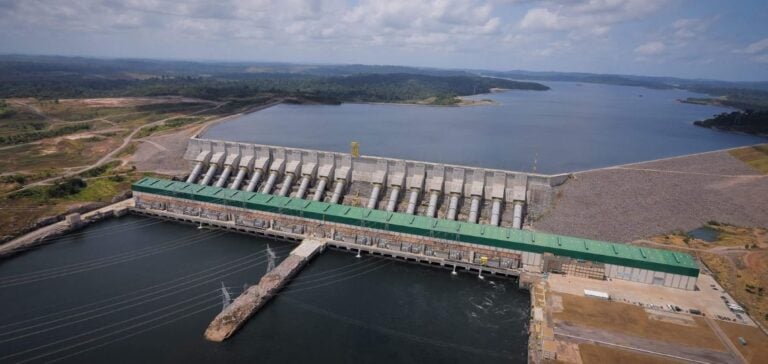Brazil’s drought continues to pose a major challenge to hydroelectric generation, which remains a key component of the country’s energy mix.
Recent reports from the London Stock Exchange Group (LSEG) show that soil moisture in the main river basins used for hydroelectric generation, such as the Paranaíba, Grande and Tocantins, has reached historically low levels for the month of September.
This drop in humidity, due to years of below-average rainfall, threatens to prolong the effects of the drought even if the seasonal rains arrive as expected.
Direct Consequences on Energy Production
Brazil, heavily dependent on its hydroelectric potential, is seeing its production capacity severely affected by these conditions.
Hydroelectric basins, which cover several vital regions of the country, are struggling to feed power station reservoirs due to parched soils absorbing rainwater before it reaches the reservoirs.
This disrupts not only production, but also the management of electricity consumption peaks.
In response to these challenges, the Operador Nacional do Sistema Elétrico (ONS) has had to rely increasingly on thermal power plants, which are often more expensive, to maintain electricity supplies, resulting in higher energy tariffs.
The effects of the drought have been particularly severe for run-of-the-river hydroelectric plants such as the Santo Antonio power station, one of the country’s largest, which has had to curtail operations due to the low flow of the Madeira River.
This type of generator depends directly on the flow of rivers, making the situation even more complex when the water supply is compromised by extreme weather conditions.
Economic impact and inflation risk
The impact on energy costs is significant.
Price increases are particularly visible with the activation of so-called “red flag” tariffs, a pricing system used in Brazil to reflect the higher costs of thermal generation.
According to some estimates by local brokers such as Warren Rena, this could add up to 32 basis points to annual inflation in 2024 if current conditions persist.
Banco Daycoval, a financial institution, also anticipates higher inflation if tariffs do not come down to lower levels by the end of the year.
Inflation generated by energy costs is not limited to electricity prices.
It has a domino effect on production costs for various industries, raising the price of consumer goods and influencing the country’s monetary policy.
Analysts expect further interest rate hikes if the situation persists, exacerbating the economic pressure already felt by Brazilian households and businesses.
Prospects for Dependency Reduction and Energy Diversification
Faced with these challenges, Brazil is seeking to diversify its energy mix to reduce its dependence on hydroelectricity.
The growth of wind and solar capacity in the north and northeast of the country has enabled some mitigation of impacts, but this transition remains limited by infrastructure issues, notably bottlenecks in transmission networks.
This prevents full utilization of the energy generated by these alternative sources, and reinforces the need for strategic investment to modernize and expand the national power grid.
However, diversification remains a long-term solution.
In the short term, Brazil’s energy supply remains vulnerable to the vagaries of the weather, and political decision-makers are under pressure to take immediate action.
Proposals are underway to improve the efficiency of reservoir and hydroelectric basin management, but these measures require substantial funding and inter-institutional cooperation.
Adopting more resilient energy policies
Brazilian decision-makers have to navigate in a complex context, where energy security is directly linked to climate variables.
Future energy policies will inevitably have to incorporate more robust natural resource management mechanisms, combined with economic strategies to cushion price shocks on the energy market.
Diversified supply is crucial, but innovations in water, reservoir and land management are also needed to guarantee the long-term stability of hydroelectric supply.
The future of Brazil’s energy sector will depend on the authorities’ ability to balance investment in renewable energies with the imperatives of energy security and economic stability.
The current situation highlights the need to rethink national energy planning to integrate not only diversification of sources, but also resilience in the face of climate challenges.






















